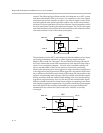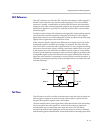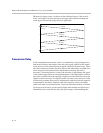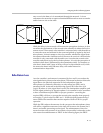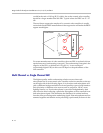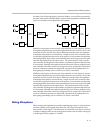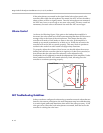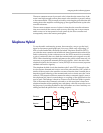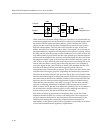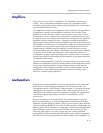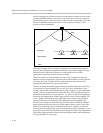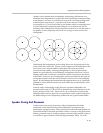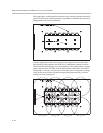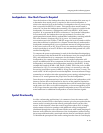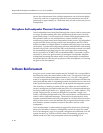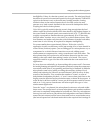
Design Guide for the Polycom SoundStructure C16, C12, C8, and SR12
B - 20
While side-tone is desirable while talking on a handset, it is not desirable in a
conferencing application. As the line echo (or side-tone) is mixed together with
the audio from the remote telephone talkers' speech, the line echo will be
played into the room over the same loudspeakers in the local room used to
hear the remote talkers. The line echo will sound like an echo of the local
talkers' speech back to them with short delay. If the signal is loud enough in
the room and there is significant loudspeaker to microphone coupling, such as
low ERL, the line echo may cause acoustic feedback to occur in the room as the
local talkers audio is played back into the room, picked up by the microphones
reflected off the telephone line interface and played back into the room. Since
the telephone signal is part of the acoustic echo canceller reference signal, the
AEC will try to echo cancel the side-tone and prevent it from being sent to the
remote side (and hence causing more side-tone) but it may not completely
cancel the signal as the system will be in double-talk, meaning that the echo
canceller will detect both the local talkers speech and the side-tone
(interpreted as the remote talkers' speech). This will prevent the acoustic echo
canceller from converging properly, degrading the conferencing experience.
The line echo canceller shown in the previous figure above is an adaptive filter
that uses the transmit signal to adapt and remove the line echo that appears on
the receive side of the line echo canceller. Similar to the acoustic echo canceller,
there may also be some non-linear suppression to remove residual echoes
when the line echo canceller is not fully converged. The line echo canceller
typically is adapting when there is transmit audio present and no receive
audio, in other words, just the local talkers are speaking. This is in contrast to
the acoustic echo canceller which typically is only adapting when there is
remote audio present and the local talkers are not talking.
Due to the variation in performance of telephone lines across the world,
telephone hybrids will have a country code setting that will be required to
properly interface the hybrid to the local phone line characteristics. If the
phone hybrid settings don't match the communications network, the
performance of the phone hybrid will be degraded, and possibly in violation
of local telecommunications regulatory requirements.
D/A
A/D
2-wire
Telephone Line
Transmit
Receive
L
LEC



